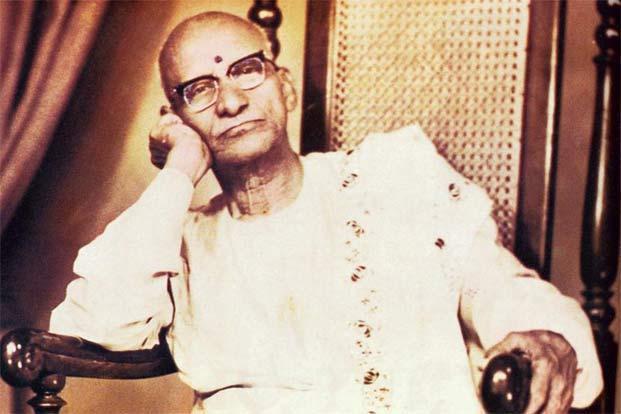Baddanna Senaani, Viswanatha Satyanarayana, V.S.N & Co, Maruthi Nagar,Vijayawada 2001, Price Rs10, pages 232.
This novel of Viswanatha Satyanarayana was written before his mega novel Veyi Padagalu. One can see the evolution of Viswanatha as a writer of vision, growing increasingly more powerful and universal in Veyi Padagalu, which encompasses, in range and depth, a greater canvas than any other novel he had written before or after. Maa Babu was the story of one individual moving from place to place in search of a home, an identity and respectability. The child who was nameless and homeless gains the trust and affection of people he lived for and loved, by becoming their source of strength. Baddanna Senani, on the other hand, is the story of a man of humbler origins, specifically from a section of society that were referred to as panchamas in those days. The story relates how he overcomes his beginnings, becomes a leader of men and an unchallenged patriot committed to the honour of his land. Nevertheless, in the final stage the author seems to be sending a strong signal about the ‘use and throw’ policies of the upper castes towards the lesser privileged in India that were prevalent then, as they are today.
In today’s India, there is no other idea more contentious and confusing than the oft spoken, much debated concept of nationalism. It is the single most misinterpreted and misunderstood notion in modern India today. The story opens with a very intense scene of how Baddanna confronts the courageous Karavala Bhairava from the neighbouring western Chalukya kingdom. Baddanna, hails from the eastern side owing allegiance to Velanati Chola king Gonka Bhupati. Paschima(western) Chalukyas, conquer parts of the Velanati Chola kingdom and wait for an opportunity to enter into this territory to celebrate the Sivaratri festival. The traditional rivalry escalates when Karavala Bhairava declares that he would enter into the enemy’s territory and the area he covers would later be annexed to their kingdom. This is against the unwritten norm of not entering the land to attend the festivities to worship Lord Siva. As he covers four gavyutas (two thousand dhanurdandas—the length of the bow, multiplied 2000 times makes one gavyuta) with hundreds of his followers Baddanna stops his onslaught and takes his challenge. In the ensuing sword fight Karavala Bharava the great warrior of the western Chalukyas was killed. Baddanna tells him as both of them were Shaivas (the fllowers of Siva),, this fight could have been avoided and that he had no option but to kill him. In the fight that saw him kill Karavala Bhairava, Baddanna was grievously injured.
He goes back home with serious wounds and enters a state of delirium. His father worries for him and at the same time feels proud of him. In fact, his whole village, Gausala, was proud of him. But while he was on bed Baadamma, his friend and teacher, who taught him the art of sword-play, was at his side and saw him through the illness. In his state of delirium Baddanna reveals his love for her. Baadamma too was, in fact, in love with him but he was almost ten years younger than her and she was already married to an old and an extremely short-tempered man named Tippanna. Her morals tell her it was a forbidden love. But Tippanna’s suspicion of her attachment to Baddanna drives her away from her husband and she gets closer to him. In the days and times of this novel, women were traditionally subjected to restrictions as a result of the strictly patriarchal norms of society. Badamma becomes an expert in sword play and was bold enough to come to Baddanna’s house to pull him through the crisis caused by his injuries. Gradually Baddanna regains his strength and pursues his dream of uniting the entire region into defeating the territorial ambitions of the Western Chalukyas. One by one, each night he visits all the villages in his part of the kingdom and establishes contact with the chieftains of these villages and encourages them to join his plan. They start building local armies. Wherever he goes, he teaches sword play to the local boys and trains them to become good foot soldiers. The chiefs of these villages -Durjayamanda, Nambayya, (the head of Kollipaka city) join him in the struggle. Baddanna was sending his loyal followers to places he could not go. All these heads have heard of the confrontation Baddanna had with Karavala Bhairava and their job becomes easier. Nambayya and Durjayamanda were sent to meet Gonka Bhupati, the king as Baddanna felt that if he goes it would become suspicious as the area was full of spies who keep a watch over Baddanna’s movements.
In this process Baddanna first goes to Koppaka and establishes contacts with the people of his community. An old man challenges him to a friendly fight and through him Baddanna learns certain tricks that help him to achieve mastery over this war game. He learns to lift the opponent’s sword into the air with his sword and cut it into pieces in the air. He comes back to his village after four days. He appoints Bunganna his representative in Koppaka village. One after the other, he visits various villages which were part of the Andhra kingdom, and each village, in absolute confidentiality, contributes forces to prepare for the future defence of their region. There were fractions within them but the greater good gets precedence and Baddanna’s leadership was tacitly agreed upon by one and all. He finally meets who was a Samantha smaller king owing allegiance to the Andhra King Kulottunga Chola. Ambayya and Durjayamanda were the key supporters of Gonka Bhupati. The army collected in ten villages will form into a dalam and ten such dalams will become an army. The complex issues of where to locate this huge army they were collecting, how to feed them, how to provide amenities for their training and procurement of weapons for all these soldiers by the river route via Papikondalu and Bhadrachalm which would then reach Rajamahendravaram were all discussed. Finally, when the war takes place, the combined action of all these small armies had helped them to defeat the enemy and re-establish the sovereignty of the Andhra Kulottunga Chola kingdom. The role played by Baddanna in the organisation of army, invoking a spirit of loyalty to the king and the role of every village in contributing to the success of the king was very graphically described throughout the novel.
The key point that Viswanatha successfully established was the sense of nationalism that was present in India even when India was not one political entity. Historically, India was conglomeration of very small kingdoms ruled by local rulers and zamindars. There were two or three tiers in the tax structure – villages paying to the land owner or zamindar, who in turn contributes to the treasury of the local rulers who finally owe their allegiance to the Andhra kings called Velanati Cholas, Kulottunga Chola in this novel. Kalingas, Mauryas, Eastern Chalukyas, Pallavas and Western Chalukyas were the dynasties that ruled over the different smaller locales in the southern region of India in the first millennium. Andhras from south and Mauryas of North extended into northern and southern regions respectively.
Baddanna and Baadamma ran away from Gausala before the war started while Baddanna was planning his strategies like accumulating the army to confront the enemies. After the war, they have returned to their village and the people, especially the heads of villages, who took the help of Baddanna earlier, start distancing themselves from him. All the leaders who became leaders of their armies, because Baddanna refused to become the commander because of his lower birth, move away from him. Those who still feel grateful were unable to raise their voices to help Baddanna. One villager approaches the panchayat for punishing Baddanna as he ran away with a married woman against the social custom. This compels them to run away again and find a safe place. In the court of chieftain Ganga Gowda, the hearing takes place after they live in exile for almost two years. Baddanna who felt that he would be invited to the victory celebrations felt totally alienated. But Dujayamanda, Nambayya and Gonka Bhupati get together to give him his due. It was suggested in the court that to resolve this issue, Baddanna should first have a sword fight with the commander of the court. Baddana agrees and decides to participate in the fight as he was provoked by people who knew that he would not be defeated. But Baddanna refuses to fight though he accepts the challenge and was killed in the unjust war. Badamma comes crying into the court and kills herself and collapses on his body. She tells the chieftain that he had made a goat to confront Baddanna, a lion. He had lost a great warrior and a great patriot. Baddanna could have made him into king, an emperor . He was not a womaniser nor was she a common prostitute. Their love, she told him, was beyond their understanding as it rose above caste. It was divine and could never be understood by common people.
At the end, one can say that it is a great tragic novel. Baddanna was a nobleman by temperament and nature, though a Panchama by birth. What one fails to understand was Baddanna is constantly conscious of his low social belonging. People rose above the caste to recognise his worth and respected him. A number of times all the heads offered him the command of their army units. But Baddanna’s self-image was so low that he refused to climb the social ladder. He could have, but the author somehow very firmly denied him the chance to rise above his strata in society. When they isolated Baddanna the author succeeded in creating a sympathy but why he did not think it fit to give him his due remains a mystery. The plot was surely weak here. The denial, it appears, comes from the author and was instilled in Baddanna when he denied himself the chance to become a great warrior commander, though he was truly one. However, in the other aspect of love between him and Baadamma, the author surprisingly becomes very pragmatic and supports the natural instinct of love beyond any barriers like caste or creed. There appears to be a contradiction in the plot as Baddanna was given a liberal treatment in love but denied his place in society despite his contribution to his land..
*









A n insightful review Mam.
As a staunch advocate of Sanatana Dharma, Vishwanatha does not surprise me here. Clearly, he’s creating a Panchama who must be aware of his Dharma because he’s always conscious of his social position and the tragic ending is his Karma because of the disturbance he created in the dharmic Order. His one Adharmic act has resulted in a tragedy. Perhaps he’s recognising the merit of liberation but he considers this particular instance to be destructive because it does not align with the Dharmic Social Order.
Shyamala garu,
This is one of the best reviews I have read of yours.. feels like really hugging you ( if not corona..haha) what a story? Baddanna Senani… what a thoughtful and ahead of times by Sri Viswanadha Satyanarayana.
I feel today we can make 100s of movies basing on these issues.. which author wrote just like that.. He is real social scientist..!
Well.. coming to why Baddanna couldn’t take his due leadership besides being a strategist etc.. I feel it’s the deep societal conditioning.. love begets certain bravery and love is a personal choice .. where as leadership and power needs social approval. Being from a low caste.. he might have thought ( that’s what conditioning works too.. may be the author thought) the social acceptance is so difficult to get.
Till today, lot of people , single woman, disabled woman, Dalits girls and boys .. are deeply conditioned. Many don’t say their marital status, many hide their caste, and some others have deep negative images about their body ( disabled persons)
Anyway.. great review.. feel like reading original.. way ahead of times this story is, and your review has given the best gist.. wonderful..!
Thank you
sai
I haven’t read this novel.But your review gave me a glimpse of the great writer , he was , Visvanatha Satyanarayana garu..The war preparations description must have been authentic to the core , as his style was.
Will read this novel.Shyamla garu.You are doing a great service by reintroducing his novels to this generation.